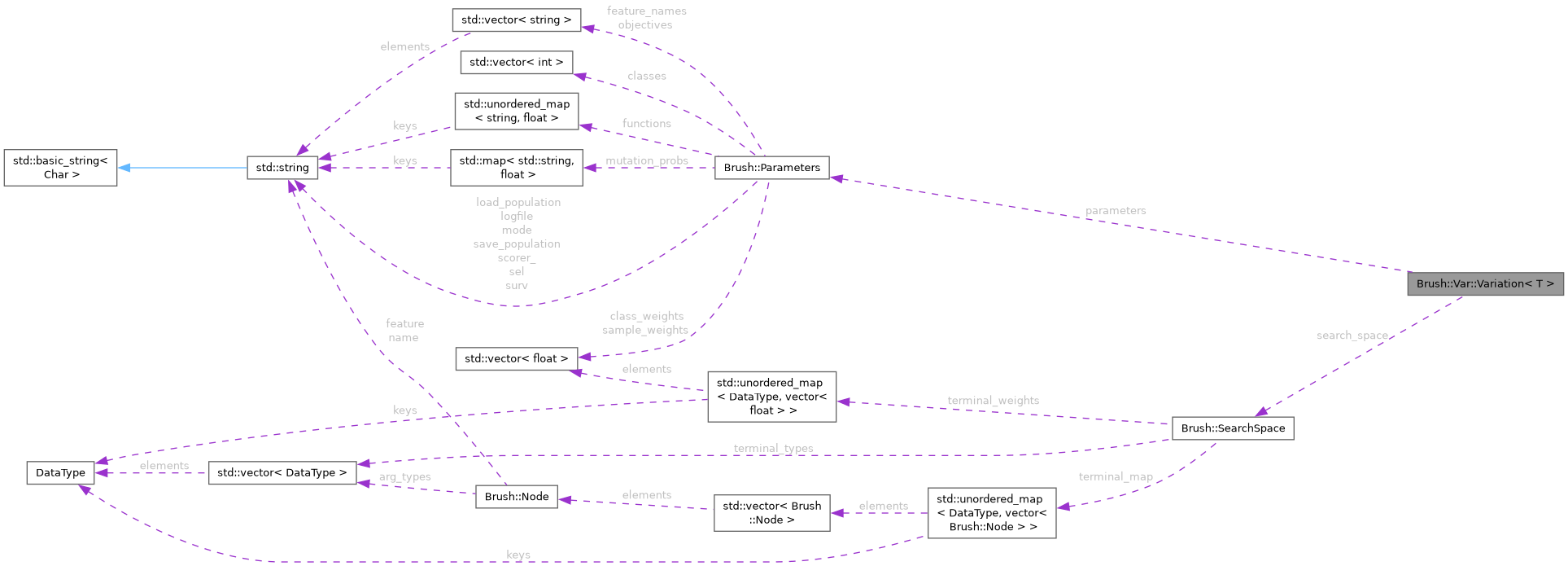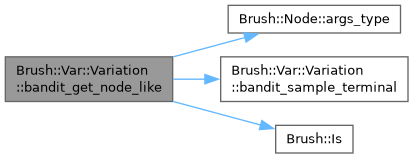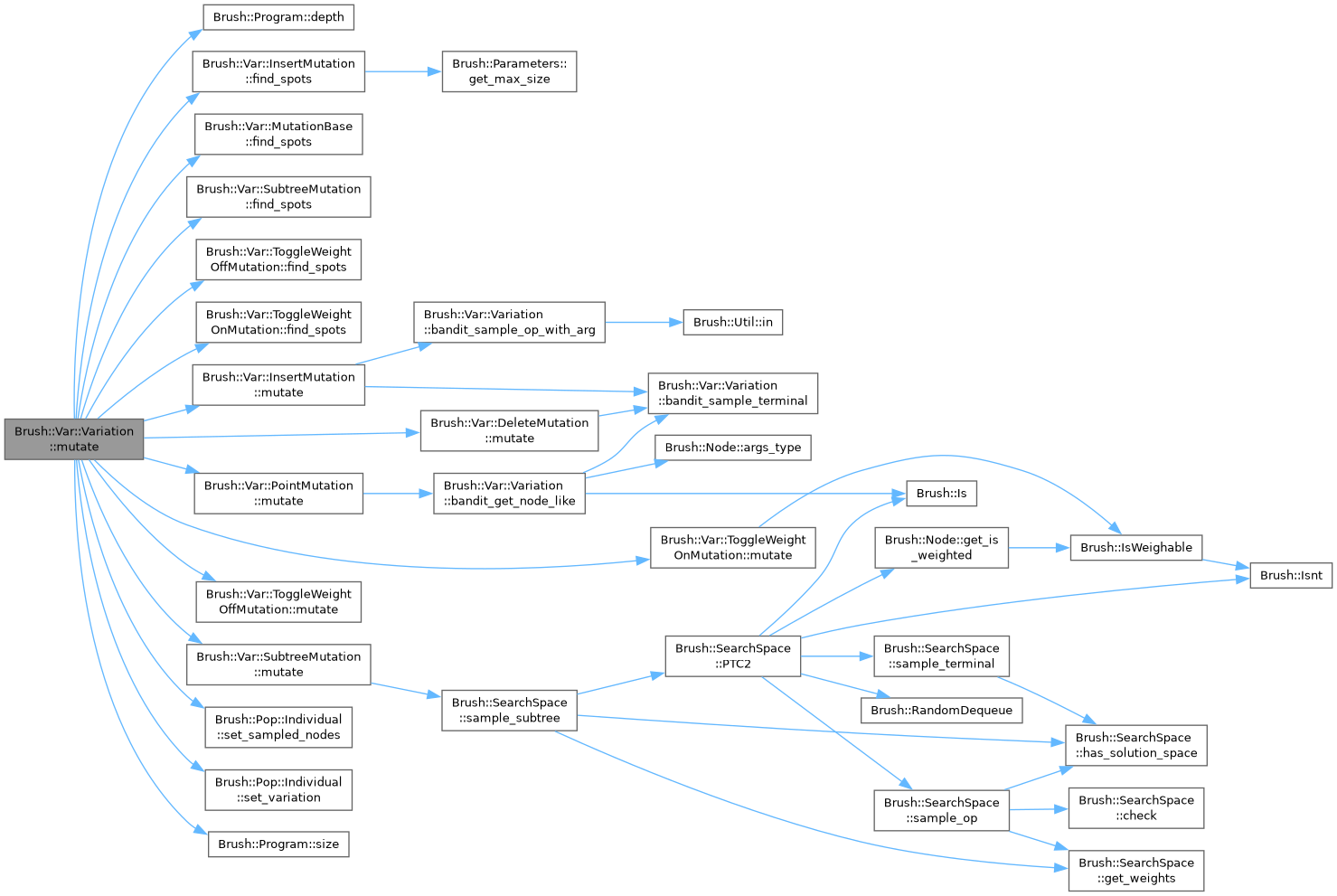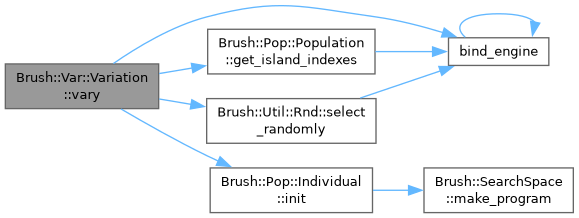Class representing the variation operators in Brush. More...
#include <variation.h>

Public Member Functions | |
| Variation ()=default | |
| Default constructor. | |
| Variation (Parameters ¶ms, SearchSpace &ss, Dataset &d) | |
| Constructor that initializes the Variation object with parameters and search space. | |
| ~Variation () | |
| Destructor. | |
| void | init () |
| Initializes the Variation object with parameters and search space. | |
| std::optional< Individual< T > > | cross (const Individual< T > &mom, const Individual< T > &dad) |
| Performs croearch_spaceover operation on two individuals. | |
| std::optional< Individual< T > > | mutate (const Individual< T > &parent, string choice="") |
| Performs mutation operation on an individual. | |
| void | vary (Population< T > &pop, int island, const vector< size_t > &parents) |
| Handles variation of a population. | |
| void | update_ss () |
| void | vary_and_update (Population< T > &pop, int island, const vector< size_t > &parents, const Dataset &data, Evaluation< T > &evaluator, bool do_simplification) |
| Varies a population and updates the selection strategy based on rewards. | |
| std::optional< Node > | bandit_sample_terminal (DataType R) |
| std::optional< Node > | bandit_get_node_like (Node node) |
| std::optional< Node > | bandit_sample_op_with_arg (DataType ret, DataType arg, int max_args=0) |
| std::optional< Node > | bandit_sample_op (DataType ret) |
| void | log_simplification_table (std::ofstream &log) |
Public Attributes | |
| SearchSpace | search_space |
| Dataset & | data |
| Parameters | parameters |
Private Attributes | |
| Bandit | variation_bandit |
| map< DataType, Bandit > | terminal_bandits |
| map< DataType, map< size_t, Bandit > > | op_bandits |
| Constants_simplifier | constants_simplifier |
| Inexact_simplifier | inexact_simplifier |
Detailed Description
class Brush::Var::Variation< T >
Class representing the variation operators in Brush.
The Variation class is responsible for performing individual-level variations and handling the variation of a population in Brush. It contains methods for crossing individuals, mutating individuals, and varying a population.
Definition at line 44 of file variation.h.
Constructor & Destructor Documentation
◆ Variation() [1/2]
|
default |
Default constructor.
◆ Variation() [2/2]
|
inline |
Constructor that initializes the Variation object with parameters and search space.
- Parameters
-
params The parameters for the variation operator. ss The search space for the variation operator.
Definition at line 57 of file variation.h.

◆ ~Variation()
|
inline |
Destructor.
Definition at line 68 of file variation.h.
Member Function Documentation
◆ bandit_get_node_like()
|
inline |
Definition at line 483 of file variation.h.


◆ bandit_sample_op()
|
inline |
Definition at line 559 of file variation.h.
◆ bandit_sample_op_with_arg()
|
inline |
Definition at line 516 of file variation.h.


◆ bandit_sample_terminal()
|
inline |
◆ cross()
| std::optional< Individual< T > > Brush::Var::Variation< T >::cross | ( | const Individual< T > & | mom, |
| const Individual< T > & | dad ) |
Performs croearch_spaceover operation on two individuals.
Stochastically swaps subtrees between root and other, returning a new program.
- Parameters
-
mom The first parent individual. dad The second parent individual.
- Returns
- An optional containing the offspring individual if the crossover is successful, or an empty optional otherwise.
The spot where the cross will take place in the root parent is sampled based on attribute get_prob_change of each node in the tree. After selecting the cross spot, the program will iterate through the other parent searching for all compatible sub-trees to replace.
Due to the stochastic behavior, it may come to a case where there is no candidate to replace the spot node. In this case, the method returns std::nullopt (and has overloads so it can be used in a boolean context).
If the cross succeeds, the child program can be accessed through the .value() attribute of the std::optional. TODO: update this documentation (it doesnt take the program but the individual. also update mutation documentation) This means that, if you use the cross as auto opt = mutate(parent, SS), either opt==false or opt.value() contains the child.
- Template Parameters
-
T the program type
- Parameters
-
root the root parent other the donating parent
- Returns
std::optionalthat may contain the child program of typeT
Definition at line 416 of file variation.cpp.


◆ init()
|
inline |
Initializes the Variation object with parameters and search space.
- Parameters
-
params The parameters for the variation operator. ss The search space for the variation operator.
Definition at line 76 of file variation.h.

◆ log_simplification_table()
|
inline |
Definition at line 581 of file variation.h.
◆ mutate()
| std::optional< Individual< T > > Brush::Var::Variation< T >::mutate | ( | const Individual< T > & | parent, |
| string | choice = "" ) |
Performs mutation operation on an individual.
Stochastically mutate a program.
- Parameters
-
parent The parent individual.
- Returns
- An optional containing the mutated individual if the mutation is successful, or an empty optional otherwise.
Types of mutation:
- point mutation changes a single node.
- insertion mutation inserts a node as the parent of an existing node, and fills in the other arguments.
- deletion mutation deletes a node.
- subtree mutation inserts a new subtree into the program.
- toggle_weight_on mutation turns a node's weight ON.
- toggle_weight_off mutation turns a node's weight OFF.
Every mutation has a probability (weight) based on global parameters. The spot where the mutation will take place is sampled based on attribute get_prob_change of each node in the tree. Inside each type of mutation, when a new node is inserted, it is sampled based on terminal_weights.
Due to the stochastic behavior, and the several sampling steps, it may come to a case where the search space does not hold any possible modification to do in the program. In this case, the method returns std::nullopt (and has overloads so it can be used in a boolean context).
If the mutation succeeds, the mutated program can be accessed through the .value() attribute of the std::optional. This method will try to generate a child that is within size and depth constraints. If ater three attempts it failed to generate a solution under these conditions, then the last model is returned regardless of it's size and depth. This loosens the size and depth constraints by a small factor (the final program will have at most 3*max_arity extra nodes), and it is better than the alternatives of just replicating the parent or generating a new random solution to add to the population.
This means that, if you use the mutation as auto opt = mutate(parent, SS), either opt==false or opt.value() contains the child program.
- Template Parameters
-
T program type
- Parameters
-
parent the program to be mutated SS a search space
- Returns
std::optionalthat may contain the child program of typeT
Definition at line 560 of file variation.cpp.


◆ update_ss()
| void Brush::Var::Variation< T >::update_ss | ( | ) |
Updates the probability distribution sampling for variation and nodes based on the given rewards.
- Parameters
-
pop The population to update the selection strategy for. rewards The rewards obtained from the evaluation of individuals.
Definition at line 760 of file variation.cpp.

◆ vary()
| void Brush::Var::Variation< T >::vary | ( | Population< T > & | pop, |
| int | island, | ||
| const vector< size_t > & | parents ) |
Handles variation of a population.
- Parameters
-
pop The population to be varied. island The island index. parents The indices of the parent individuals. p The parameters for the variation operator.
Definition at line 674 of file variation.cpp.

◆ vary_and_update()
|
inline |
Varies a population and updates the selection strategy based on rewards.
This function performs variation on a population, calculates rewards, and updates the selection strategy based on the obtained rewards.
- Parameters
-
pop The population to be varied and updated. island The island index. parents The indices of the parent individuals.
Definition at line 220 of file variation.h.


Member Data Documentation
◆ constants_simplifier
|
private |
Definition at line 603 of file variation.h.
◆ data
| Dataset& Brush::Var::Variation< T >::data |
Definition at line 592 of file variation.h.
◆ inexact_simplifier
|
private |
Definition at line 604 of file variation.h.
◆ op_bandits
|
private |
Definition at line 600 of file variation.h.
◆ parameters
| Parameters Brush::Var::Variation< T >::parameters |
Definition at line 593 of file variation.h.
◆ search_space
| SearchSpace Brush::Var::Variation< T >::search_space |
Definition at line 591 of file variation.h.
◆ terminal_bandits
|
private |
Definition at line 599 of file variation.h.
◆ variation_bandit
|
private |
Definition at line 598 of file variation.h.
The documentation for this class was generated from the following files:
